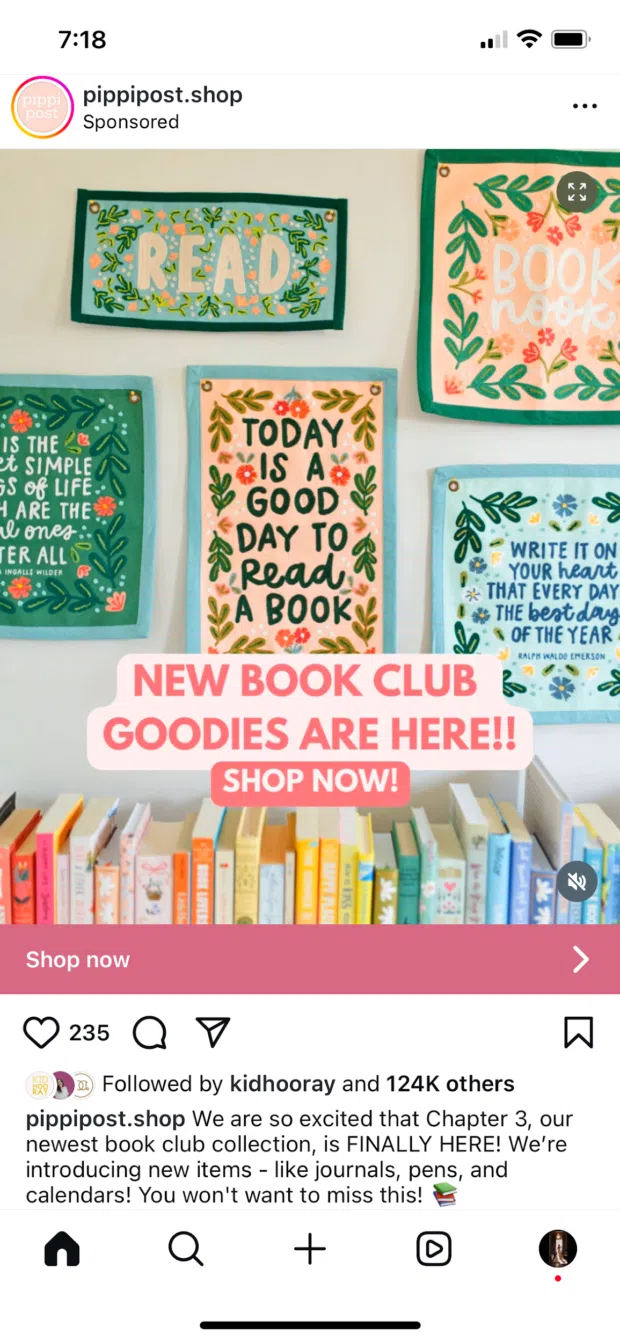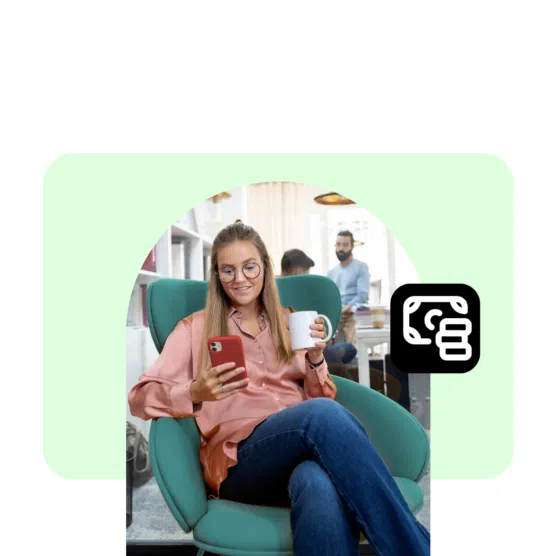Table of Contents
You could spend your days trying to outsmart Instagram’s ever-changing algorithm. Or, you can take the direct route with Instagram ads.
In this guide, we’ll break down the different types of Instagram ads, what they cost, and how to create ad campaigns that actually perform.
Key Takeaways
- Instagram ads are paid posts that show up in the Feed, Stories, Reels, and Explore, always marked with a “Sponsored” tag.
- The most effective Instagram ads are mobile-friendly, with vertical visuals and minimal text.
- The cost of Instagram ads varies, but 2025 averages land around a $1.31 CPC and a $15.26 CPM.
- Meta Ads Manager and Hootsuite give you guided workflows to build, target, budget, and publish Instagram ads without the guesswork.
What are Instagram ads?
Instagram ads are paid posts that brands use to get in front of a specific audience. These ads appear across the Instagram platform, including the Feed, Stories, Reels, and the Explore page.
While they look similar to normal Instagram posts, they always include a Sponsored tag, plus extra features like CTA buttons, product tags, and links.
Instagram ads can contain images, videos, carousels (multiple images), or collections (dynamic product galleries).

Source: Pippi Post
Types of Instagram ads
Instagram offers many different advertising formats designed for different goals, audiences, and creative styles.
Let’s take a look at each type of ad below.
Image ads
Image ads are static images used to promote a product, service, or campaign.
These types of ads work best when your visual is strong enough to tell the full story (think: a scroll-stopping photo or illustration).

Source: Book of the Month
It’s also possible to add text to images. However, Instagram recommends limiting overlaid text as much as possible for accessibility.
Video ads
Instagram video ads combine visual storytelling with sound (optional).
Video ads are a great way to showcase your product or service in an eye-catching way. Use video to show how your product works, highlight standout features, or just give people a feel for your brand.
There are two types of video-based ads you can run on Instagram:
Feed video ads:
- Appear only in the main feed
- Open the landing page immediately when someone taps the video
Reels ads:
- Appear in both the home feed and the Reels feed
- Open as a full-screen Reel when tapped, with a CTA button at the bottom
Which one should you choose? If you want clicks, feed videos get people straight to your landing page. If you want reach, visibility, and content that feels native to the platform, Reels ads are your best bet.

Source: Hydro Flask
Psst: Read more about Instagram ad specs in our best practices for designing Instagram video ads.
Story ads
Story ads pop up between the Stories people are already tapping through, so they already feel natural. And they take up the full screen, which makes them harder to skip.
Story ads can be photos, videos, or carousels — whatever helps you tell the story fast. Your CTA shows up as a swipe-up link or a link sticker, depending on the format you choose.
You can see both options in the example below:

Source: Ember
The best Instagram Stories ads look and feel like normal Stories. When designing Stories ads, businesses can use all organic Instagram Stories features like filters, text, GIFs, and interactive stickers.
Carousel ads
Carousel ads let you feature multiple images or videos in one swipeable post. They can show up in the Instagram feed or in Stories, and each card can push people to your site with a CTA button or swipe-up link.
Carousels are perfect when you want to:
- Share up to 10 images or videos in one go
- Show off a group of products
- Tell a story in chapters

Source: Mint & Lily
Collection ads
Instagram collection ads blend the swipeability of carousels with the power of shopping ads.
Collection ads showcase products directly from your product catalog. They’re a great fit for Instagram ecommerce brands because users can browse and purchase right from the ad.
When a user clicks on the ad, it opens an Instant Experience Storefront where they can explore the product and check out without ever leaving Instagram.

Source: Away
Explore ads
Explore ads appear under the Explore tab, where Instagram users go to discover new content and accounts based on their Instagram behavior.
They look just like regular posts, but you’ll spot the “Sponsored” label in the top right corner. Take a look below to see what we mean:

Source: KiwiCo
However, Instagram Explore ads don’t just appear in the Explore grid.
They also appear after someone taps a photo or video and starts scrolling through related content. Since Explore is always shifting with trends and culture, your ads get served next to whatever people are obsessed with right now.
Explore ads can be images or videos, and here’s the best part: you don’t have to make anything new. You can reuse the ad assets you already have.
Shopping ads
With Instagram’s Shopping features, users can view and purchase products without leaving the app (as long as you have Instagram Checkout set up).
These ads tag items from your product catalog, and when someone taps, they go straight to an in-app product page where they can get the details and complete the purchase on your mobile site.

Source: Hydro Flask
To run Shopping ads, you need to set up your Instagram Shopping product catalog first.
Pro tip 💡: Take advantage of Hootsuite’s integration with Shopify to access your catalog right from your Hootsuite dashboard.
Reels ads
Reels ads show up right between the Reels people are already scrolling, so they blend in naturally. They use similar specs to Stories ads (full-screen vertical videos), and can be up to 60 seconds, but shorter is usually better.
Every Instagram Reels ad includes a Sponsored label and a call-to-action button, and viewers can like, comment, share, and save them just like any other Reel. They’ll loop on repeat until someone scrolls past.

Source: Mixtiles
How much do Instagram ads cost?
The cost of Instagram ads depends on the total budget, duration, and objectives you’ve set for your ad or campaign. You can set a daily or lifetime budget for your Instagram ads, so it’s up to you how much you want to spend.
Below, you’ll find the average Instagram ad costs in 2025.
2025 Instagram cost benchmarks
| Metric | Cost |
| Cost per click (CPC) | $1.31 |
| Cost per impression (CPM) | $15.26 |
| Cost per engagement (CPE) | $0.067 |
| Cost per lead (CPL) | $11.31 |
What affects Instagram ad costs?
Here are a few factors that affect Instagram ad costs:
- Audience size: Smaller, more niche audiences tend to be more expensive to reach.
- Industry competition: In crowded categories — like beauty, wellness, apparel, and home goods — more brands are bidding for the same users, pushing costs up.
- Seasonality: Costs climb during big shopping moments like Black Friday and the Q4 holiday rush.
- Your chosen ad placement: Feed, Stories, Reels — each placement comes with its own price range.
- Bidding strategy: Manual bids can get expensive fast. Automated bidding keeps things a bit more efficient.
How do you choose the right bid amount for your Instagram ads?
The right bid amount comes down to your budget, your goals, and how competitive your industry is.
When you set up a campaign, you can either let Instagram handle bidding for you or manually set a max bid if you want tighter control over spend.
As your ads run, you’ll start to see the real cost of reaching people in your target audience. Once you understand those patterns, you can adjust your bid to scale reach or efficiency.
Pro tip 💡: The easiest way to sanity-check your numbers is to set up a draft campaign in Ads Manager. Then, look at the Audience Definition and Estimated Daily Results panels. They give you a quick read on whether your bid is competitive enough to hit your goals.
How to run Instagram ads with Meta Ads Manager
Let’s walk through how to start running Instagram ads with Meta Ads Manager.
Step 1: Create a new campaign
First, head to your Facebook Page, then click Meta Business Suite on the left sidebar. From there, click Ads Manager in your Business Suite’s left sidebar and select Campaigns from the dropdown.

You’ll be taken to a list of all active, paused, past, and drafted campaigns — or, a blank slate if this is your first time running a Facebook or Instagram ad.
Click Create under the Campaigns tab header to get started.
Step 2: Select your buying type
Next, choose a buying type. You have two choices: Auction or Reservation.
Here’s how Meta breaks it down:
- Reservation: You lock in your campaign ahead of time, get predictable performance, and have tighter control over ad frequency. These placements run on Facebook and Instagram.
- Auction: You get more flexibility and more choice, but results can fluctuate. These ads can run across Facebook, Messenger, Instagram, and the Meta Audience Network.
For the purposes of this tutorial, we’ll be sticking with Auction.

Step 3: Choose your ad objective
Next, select an ad objective that works with Instagram ads. Meta gives you six options:
- Engagement: Choose this if you want more interactions (e.g., video views, Page activity, etc.).
- Traffic: Choose this if you want to send people to your website, landing page, or app.
- Awareness: Choose this if you want more people to see your brand and remember it later.
- App promotion: Choose this if you want more installs or to nudge users into deeper in-app activity.
- Sales: Choose this if you want to drive purchases, product page visits, or revenue-focused conversations.
- Leads: Choose this if you want sign-ups, form fills, or any kind of high-intent lead.
FYI: You can use any of these objectives for Instagram ads, minus Awareness.
We’re going to select traffic as our objective.
Step 4: Choose your campaign setup
Now it’s time to decide whether you want Meta to guide your setup or you’d rather build the campaign yourself.
If you’re comfortable running digital ads, go ahead and choose a manual setup. If you’re newer to Instagram ads or just want a smoother lift, Meta’s automated options can help you get strong results with less tinkering.

A quick heads-up: Meta uses different names for its automated setups depending on your objective. For example:
- Traffic: Recommended settings
- Engagement: Tailored messages campaign
- Leads: Recommended settings
- App promotion: Advantage+ app campaign
- Sales: Advantage+ shopping campaign
Step 5: Test additional settings
At this stage, you’ll need to confirm whether your ad falls into one of Meta’s special ad categories that require additional compliance, like finance, employment, housing, or social issues.
If you’re not sure, click Categorize your ads for a quick breakdown of what qualifies.

You’ll also see options to turn on Advantage campaign budget and A/B testing.
Advantage campaign budget automatically shifts spend toward the ad sets most likely to hit your performance goals. A/B testing lets you compare different versions of an ad and keep the top performer running.
Toggle either option on if you want Meta to help you optimize as you go.
Step 6: Set your performance goal
Next, you’ll need to set your performance goal. The interface of this specific section will vary depending on your ad objective.
As you can see below, we first start with what a conversion is for our traffic ad (we’re choosing sending traffic to a website) before choosing your performance goal from the dropdown menu.

Your performance goal measures the overall success of your ad campaign. In the above example, our goal is to maximize the number of link clicks for our budget.
Take a look at all of the available performance goals based on your ad objective and choose the one that makes the most sense for your ad campaign.
Step 7: Set your budget and ad schedule
Next, decide how long you want your ad to run and how much you plan to spend.

You have two options:
- A daily budget keeps your campaign running continuously while Meta spends roughly the same amount each day.
- A lifetime budget lets you set start and end dates, and Meta will spread your spend across the full campaign window.
Step 8: Define your audience
At this step, select the audience you want your ad to target. You can have Meta take care of this for you, or you can create your own custom audience.

You can also create lookalike audiences based on people who already engage with your Instagram account or website. It’s an easy way to reach new people who are likely to care about what you offer.
Step 9: Choose your placements
Next, you’ll choose your ad placements. Meta can place them automatically (which usually gets you the best reach for your budget) but you can take the wheel if you prefer more control.

Psst: If you want your ad to run only on Instagram and not Facebook, you should manually select your ad placements.
Step 10: Create your ad
Time to bring your ad to life. Pick your Instagram account from the dropdown, upload your creative, and fill in the details.

The interface here will also change based on your ad objective and the type of ad you choose to run. For example, you might see the option to run a single image ad versus a collection ad.
As you build, you’ll get a live preview on the right so you can double-check that everything looks the way you imagined.
When you’re happy with it, hit Publish. Meta will review your ad, and once it’s approved, you’ll be able to start tracking performance.
How to run Instagram ads with Hootsuite in 6 steps
Here’s a quick five-step tutorial for running Instagram ads with Hootsuite.
Step 1: Create a new Facebook ads campaign
Log into your Hootsuite account and click Ads in the left navigation bar.
Using Hootsuite, you can do a simple boosted post on Facebook, Instagram, or LinkedIn, but you can also set up full campaigns on Facebook (Instagram is included here), LinkedIn, and X/Twitter.
To get started, click on Facebook ad campaigns in the left sidebar, then click Create ad campaign in the top right corner.

Step 2: Set your campaign objective
Then, follow Hootsuite’s guided steps. The first page prompts you to choose a campaign objective.

Here, you’ll need to select your Facebook Page (the one that is linked to your business’s Instagram account) and your ad account.
Then, give your campaign a name and select your objective from the available options. You’ll also choose your conversion location and what you want to optimize your campaign for (like landing page visits or post engagement).
Step 3: Choose your audience and budget
Here, you’ll input your audience targeting details using demographics, behavior, and interests. You can also access any saved audiences you have on Meta and build lookalike audiences with Hootsuite’s campaign builder.

Next, set your budget and the length of your ad campaign. Similar to Meta, you can choose a daily budget (your ad run indefinitely as long as it hits its daily budget) or a lifetime budget (your ad has a start and end date and hits your budget for the length of the campaign).

Step 4: Create your ads
Next, you’ll create your ads by uploading the images and/or videos you want to use.

For Instagram ads, images must have an aspect ratio between 0.565 and 7.8, and be at least 500px by 500px. Videos must be larger than 500px by 262px, have an aspect ratio between 4:5 and 16:9, and must be 120 seconds or shorter.
As you build your ad, you’ll be able to see an ad preview to ensure everything looks the way you’ve envisioned.
You’ll also need to input information like:
- Description
- Call to action
- Headline
- Website URL

Pro tip 💡: You can take advantage of Hootsuite’s AI writer to help optimize your ad copy before you finalize your campaign.
Step 5: Publish campaign
Now it’s time to hit Publish.
Once your ad is live, you can continue to monitor its performance from your Hootsuite dashboard so that you don’t have to try navigating Meta’s complex business suite at all.

Step 6: Track ad conversions with Hootsuite’s Pixel Connector
Hootsuite’s Pixel Connector gives you reliable data to track the path to purchase, from initial brand discovery to the sale (or other tracked conversion).
Learn how to set up this secure server-to-server communication through your Hootsuite dashboard:

5 tips to build a winning Instagram ads strategy
Now you have everything you need to know about setting up and launching Instagram ads. The next step is designing effective visual assets for your ads.
Here are some tips for how to design attention-grabbing creative for Instagram ads.
1. Think mobile first
BInstagram lives on people’s phones, so your ads need to be built for mobile from the start, not resized after the fact.
Here’s how to think mobile first:
- Shoot vertically. Match the shape of a phone screen so your ad fills the frame.
- Go light on text. If you use it, make it big, bold, and readable at a glance.
- Add movement. Animations, quick cuts, or subtle motion help stop the scroll.
- Keep it short. Fifteen seconds or less is the sweet spot. Instagram moves fast, and your ads should too.
You can still learn how to post on Instagram from desktop.
2. Assume the sound is off
Adam Mosseri, Head of Instagram, recently shared that roughly 50% of users scroll with the sound off.
That means your ads need to make sense in total silence and still feel rewarding if someone decides to tap the volume on.
Here’s how to pull that off:
- Add captions for any voiceover or scripted audio
- Use visual elements to carry the story
- Add text overlays to reinforce your main message
3. Design with brand top of mind
The first few seconds of your ad are the most important. If it doesn’t grab someone right away, they’ll scroll past before your message even lands.
That’s why it’s important to start your ad with the key message and showcase your branding within the first 3 seconds.
To do this, consider these tips:
- Incorporate your brand brand awareness through colors and fonts
- Infuse your brand personality from the start
- Create a recognizable brand across your online presence

Build and post ads for Facebook, Instagram, LinkedIn, and X. Our targeting and reporting are seriously easy.
Start free 30-day trial4. Play with different ad types
With so many Instagram ad formats to choose from, you can experiment to find the right combination of visuals and messaging that resonates best with your target audience.
Consider incorporating video ads, Story ads, carousel posts, collections, shoppable posts, and more into your advertising approach.
Similarly, get creative with your creative! Why not test out some meme ads, create custom illustrations, or GIFs to get your message out? Remember, Instagram ads should reflect your brand’s overall aesthetic and style.
But that said, there’s no reason why you shouldn’t switch things up to keep your audience engaged.
5. Pay attention to your analytics
The only way to know if your Instagram ads are actually working is to check the numbers. Instagram’s reporting tools show you the essentials like impressions, clicks, engagement, and ROI so you can see what’s pulling its weight.
If you want deeper insight into what happens after someone leaves Instagram, connect your Pixel for more detailed tracking.
Pro tip 💡: You can also use third-party tools — like Hootsuite — to track your campaign performance in more detail and make data-driven decisions on improving future ad campaigns.
3 great Instagram advertising examples
To get inspired, let’s look at some successful Instagram ad campaigns from other brands.
As you browse these Instagram ad examples, consider the types of visuals used, where ads are placed within stories, and how businesses use copy to engage their target audiences.
1. Speks
Speks is a fidget toy retailer, and one of its products is the squishy stress balls you see advertised below.

Source: Speks
The video opens with bold colors and clear product placement, then jumps right into the satisfying “squeeze” moment that makes you want one instantly.
The bright “Shop now” button seals the deal by giving viewers an easy next step. It’s a great reminder to lean into creative ways to showcase your product and how potential customers can use it.
2. Crocs
Shoe company Crocs put together a pretty and pink Stories ad to promote its new “Cozzzy Sandals.”

Source: Crocs
The product shows up immediately (smart move for fast-tapping Story viewers), while the text pops in piece by piece to reinforce the message.
A matching “Shop now” sticker gives people a quick path to buy, which makes the whole thing feel effortless. It’s a great example of putting your product front and center, even if the rest of the copy comes in later.
3. Canopy
Humidifier brand Canopy created a simple image ad to promote its new bedside humidifier.

Source: Canopy
The high-quality product shot does the heavy lifting, and the light text overlay highlights exactly what makes it special without crowding the frame.
In the caption, they expand on the details so shoppers get the full story before deciding to buy. It’s a great reminder that photo ads can be just as powerful as video when you pair strong visuals with clear, helpful messaging.
FAQ: Instagram Ads
What are the best Instagram ad strategies for enterprise brands?
Enterprise teams focus on consistency, clean targeting, and ad creative that feels native to the platform. They also lean on strong audience segmentation and clear messaging that matches where a customer is in their journey.
What Instagram ad formats drive the highest ROI?
Reels and Story ads tend to deliver the strongest ROI because they feel natural in the flow of the app. Short video hooks, simple messaging, and clear CTAs usually work best. The key is choosing a format that matches your goal, not just what is trending.
What tools help manage and report on Instagram ads at scale?
Hootsuite, Meta Ads Manager, and enterprise paid social platforms make it easy to plan, publish, approve, and report without drowning in spreadsheets. They also give you a clean view of what’s working across markets so you can fix gaps fast and double down on what’s actually working.
How to optimize Instagram ad performance across markets
Start by tailoring your creative to local culture, language, and behavior, then keep an eye on your analytics to see when people are actually online and what they click on. Give regions room to adapt, but anchor everything in one clear brand playbook.
How to use Instagram ads across the full customer journey
Think of your ads like guideposts. Use Reels to get on someone’s radar, and Collection or Shopping ads to help them buy when they’re ready. Retargeting closes the loop, and education-style content keeps people around.
Integrate your paid and organic social strategies to strengthen connections with existing customers and reach new ones. Use Hootsuite Social Advertising to easily keep track of all of your social media activity — including ad campaigns — and get a complete view of your social ROI. Try it for free.






